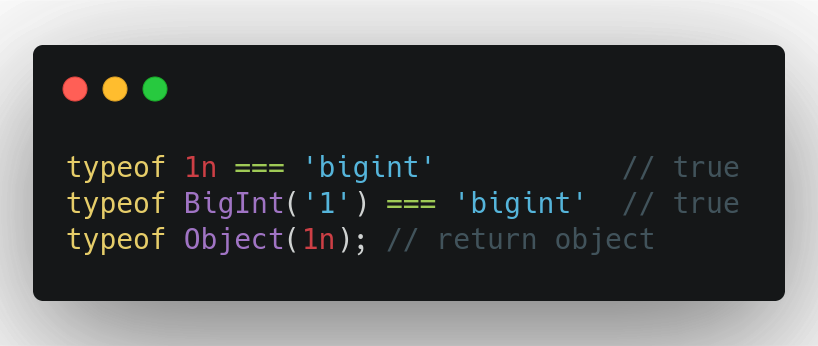목차
-
ECMAScript는 무엇인가요?
-
BigInt
-
import()
-
Promise.allSettled()
-
globalThis
-
Nullish 통합 연산자 ??
-
선택적 체이닝 연산자 ?.
1. ECMAScript는 무엇인가요? - What is ECMAScript
자바스크립트는 ECMAScript 사양에 기반한 프로그래밍 언어입니다. ActionScript나 Javascript, JSccript, TypeScript는 모두 ECMAScript를 핵심으로 사용합니다. 비교하자면, AS/JS/JScript/TS는 4개의 다른 자동차지만 각각의 외형도 다르고 특징을 가지기 위해 수정되더라도, 같은 엔진을 사용하는 것입니다.
ECMAScript 의 역사 - History of ECMAScript
Brendan Eich는 Mocha를 개발해냈습니다. 이것은 추후에 LiveScript가 되고, 후에 Javascript가 되었습니다. Netscape(넷스케이프)는 Javascript를 Ecma International 에 Javascript를 발표하였고, ECMA-262 (ECMAScript) 로 명명되었습니다.
Brendan Eich의 "Javascript"는 핵심 언어(ECMAScript라고 하는)를 개발했습니다. 해당 언어는 현재 브라우저 공급업체가 구현하는 Javascript와는 다릅니다.
더많은 역사를 보고싶으시다면 여기를 클릭하세요! here
ECMAScript - Wikipedia
From Wikipedia, the free encyclopedia Jump to navigation Jump to search Official specification on which JavaScript and other languages are based This article needs to be updated. Please update this article to reflect recent events or newly available inform
en.wikipedia.org
1. BigInt
BigInt 는 2⁵³ — 1JS에서 가장 큰 숫자 인보다 큰 정수를 표현하는 방법을 제공하는 내장 객체입니다 . Javascript는 이제 Number9007199254740992에서 최대 값이 아닌 기본 요소를 넘어서 안정적으로 나타낼 수 있습니다 .
BigInt 는 n정수 (예 :) 에 더하거나 를 5n호출 하여 생성됩니다.
const theBiggestInt = 9007199254740991n
const hugeOne = BigInt(9007199254740991) // 9007199254740991n
const hugeString = BigInt("9007199254740991") // 9007199254740991nBigInt 만들기
BigInt 는 Number 와 유사하지만 몇 가지 차이점이 있습니다.
-
기본 제공 Math 객체의 메서드와 함께 사용할 수 없습니다 .
-
BigInt 는 Number 의 instance 와 함께 사용할 수 없습니다.
BigInt 는 변경하지 않을 경우 다른 BigInt 변수와 사용할 수 있습니다.
BigInt 유형 검사
typeof BigInt 를 이용해 다음과 같이 확인 할 수 있습니다.
typeof 1n === 'bigint' // true
typeof BigInt('1') === 'bigint' // true
typeof Object(1n) // object
... 서용법은 생략
3. import()
동적인 import() 는 요청된 모듈의 객체의 모듈 네임스페이스(module namespace)를 promise 형식으로 반환합니다. 그러므로 imports는 async/await를 사용하여 변수에 할당 될 수 있습니다.
// option 1
const helperModule = './helpers.js'
import(helperModule).then((module) => {
module.doStuff1() // Method 1
module.doStuff2() // Method 2
})
// option 2
(
async function importCheck () {
const helperModue = './helpers.js'
const module = await import(helperModule)
module.doStuff1() // Method 1
module.doStuff2() // Method 2
}
)()4. Promise.allSettled()
이 메서드는 모든 promise가 생성되었는지 아닌지를 체크하는 promise를 위한 또 다른 방법입니다.
Promise.all()과 Promise.allSettled() 의 차이는
Promise.all() 모든 promise가 오류없이 성공적으로 해결 된 경우에만 해결됩니다. 약속이 rejected되면 .all 이 resolved되지 않습니다. 반면에 Promise.allSettled() Promise가 이 resolved되거나 rejected 되어도 해결됩니다.
예제를 확인하면, 3개의 timer과 resolve / reject 상태와 함께 Promise가 생성되고, Promise.allSettled() 를 생성하고 마지막 promise가 완료되면, wait 될것입니다.
5. globalThis
브라우저에 이미 존재하는 window 객체가 있는데 globalThis는 왜 필요할까요?
console.log (window)
console.log (self)
console.log (frames)
console.log (this)이들은 모두 같은 window 객체를 반환합니다.
Window {parent: Window, postMessage: ƒ, blur: ƒ, focus: ƒ, close: ƒ, …}그러나 웹 워커(webworker)를 사용하는 경우에만 self가 작동하며, Node.js를 사용하는 경우에는 별도의 global 객체가 호출 되며 window 에 접근할 수 없습니다.
이러한 플랫폼 별 특정 전역객체를 피하기 위해 JavaScript는 모든 플랫폼에서 작동 하는 globalThis을 추가하기로 결정했습니다 .
console.log(globalThis);
6. Nullish Coalescinig Operator :: null 통합 연산자 - ??
JavaScript에서는 아래와 같은 객체를 사용합니다.
const user = {
profile: {
name: 'JJD',
age: 22
}
}
console.log (user.profile.name) // 'JJD'그러나 속성 이름이 존재하지 않는 경우에는 undefined 를 출력합니다.
속성이 존재하지 않는 경우는 값을 제공하여 이 경우를 처리 할 수 있습니다.
const user = {
profile: {
age: 22
}
}
console.log (user.profile.name) // undefined
console.log (user.profile.name || 'kumar')그러나 아래 예제와 같이 name 속성이 비어 있으면 어떻게 될까요?
const user = {
profile: {
name: '',
age: 22
}
}
console.log (user.profile.name || 'kumar')빈 문자열이더라도 JavaScript는 값이 없는 것(falsy)으로 간주하여 'kumar' 데이터를 반환합니다.
이를 방지하기 위해 다음과 같이 nullish 병합 연산자를 사용할 수 있습니다.
console.log (user.profile.name ?? 'kumar') // ''이제 결과를 빈 문자열로 반환합니다. nullish 연산자는 값이 undefined 또는 null 인지를 확인합니다.
7. Optional Chaining :: 선택적 연결 연산자 - ?.
위에서 만든 것과 동일한 예제를 사용합니다.
const user = {}
console.log (user.profile.name) // Error!이 예제는 정의되지 않은 오브젝트에서 에러가 발생합니다.
기존에 Javascript는 이런식으로 예외를 처리했습니다.
console.log(user && user.profile && user.profile.name)여기서는 해당 property가 정의되어있는지 아닌지, 사용 가능한지를 확인합니다.
그러나 이제 우리는 optional chaining operator를 사용하여 깔끔하게 코드를 작성할 수 있습니다.
console.log (user?.profile?.name)이 예제는 profile 이나 name 프로퍼티가 존재하지 않으면 undefined를 반환하게 됩니다.
출처 : medium.com/codingtown/ecmascript-2020-aka-es-11-9c547f69d96f
'FRONTEND > Javascript' 카테고리의 다른 글
| 2) Typescript - interface (0) | 2021.01.25 |
|---|---|
| 1) Typescript 기본 타입 사용법 및 정리 (0) | 2021.01.22 |
| P_브라우저 객체 모델 (0) | 2020.10.06 |
| Javascript Function - 함수 표현식 (0) | 2020.09.23 |
| Javascript의 프로토타입 (0) | 2020.09.03 |




댓글